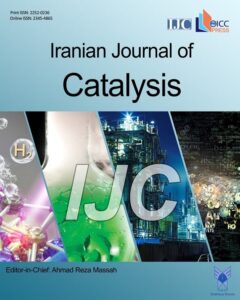Pilot scale study of Co-Fe-Ni nanocatalyst for CO hydrogenation in Fischer-Tropsch synthesis
Authors
Abstract
In this work, a Co-Fe-Ni catalyst was prepared and the effect of a range of operational variables such as gas hourly space velocity (GHSV), calcination temperature, calcination time and agent on its catalytic performance for green-fuels production was investigated. By application of different characterization techniques such as XRD, BET, TGA/DSC, and SEM, it was found that these parameters have great effects on the structure, porosity, morphology and physic-chemical properties of this catalyst. The optimum conditions were found for the samples which were calcined at 550 ℃ in air for 6 hours, and operated at 300 ℃ and 4800h-1 as the reaction temperature and GHSV respectively. Results also revealed that any increase in the calcination temperature promotes the product shifting towards heavier hydrocarbons (more C5+ production). Calcination in air atmosphere was more effective than calcination in N2 atmosphere.



